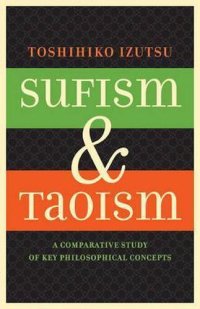
Ebook: Sufism and Taoism: A Comparative Study of Key Philosophical Concepts
Author: Toshihiko Izutsu 井筒 俊彦
- Year: 1983
- Publisher: The University of California Press
- City: London, UK / Berkeley & Los Angeles, USA
- Edition: 1ˢᵗ
- Language: English
- pdf
In this deeply learned work, Toshihiko Izutsu (1914–1993) compares the metaphysical and mystical thought-systems of Ṣūfism and Taoism and discovers that, although historically unrelated, the two share features and patterns which prove fruitful for a trans-historical dialogue. His original and suggestive approach opens new doors in the study of comparative philosophy and mysticism.
Izutsu begins with ʾibn al-ʿArabī (1165–1240 ᴄᴇ), analyzing and isolating the major ontological concepts of this most challenging of ʾIslāmic thinkers. Then, in the second part of the book, Izutsu turns his attention to an analysis of parallel concepts of two great Taoist thinkers, Láo Zi (c. 6th ʙᴄᴇ) and Zhuang Zhou (c. 369 – c. 286 ʙᴄᴇ). Only after laying bare the fundamental structure of each world view does Izutsu embark, in the final section of the book, upon a comparative analysis. Only thus, he argues, can he be sure to avoid easy and superficial comparisons. Izutsu maintains that both the Ṣūfī and Taoist world views are based on two pivots—“the Absolute Man” and “the Perfect Man”—with a whole system of ontological thought being developed between these two pivots. Izutsu discusses similarities in these ontological systems and advances the hypothesis that certain patterns of mystical and metaphysical thought may be shared even by systems with no apparent historical connection.
Izutsu begins with ʾibn al-ʿArabī (1165–1240 ᴄᴇ), analyzing and isolating the major ontological concepts of this most challenging of ʾIslāmic thinkers. Then, in the second part of the book, Izutsu turns his attention to an analysis of parallel concepts of two great Taoist thinkers, Láo Zi (c. 6th ʙᴄᴇ) and Zhuang Zhou (c. 369 – c. 286 ʙᴄᴇ). Only after laying bare the fundamental structure of each world view does Izutsu embark, in the final section of the book, upon a comparative analysis. Only thus, he argues, can he be sure to avoid easy and superficial comparisons. Izutsu maintains that both the Ṣūfī and Taoist world views are based on two pivots—“the Absolute Man” and “the Perfect Man”—with a whole system of ontological thought being developed between these two pivots. Izutsu discusses similarities in these ontological systems and advances the hypothesis that certain patterns of mystical and metaphysical thought may be shared even by systems with no apparent historical connection.
Download the book Sufism and Taoism: A Comparative Study of Key Philosophical Concepts for free or read online
Continue reading on any device:

Last viewed books
Related books
{related-news}
Comments (0)